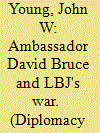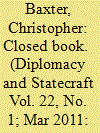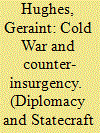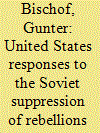|
|
|
Sort Order |
|
|
|
Items / Page
|
|
|
|
|
|
|
| Srl | Item |
| 1 |
ID:
102957


|
|
|
|
|
| Publication |
2011.
|
| Summary/Abstract |
Recent decades have seen growing historical interest in "second rank" officials who, whilst they do not play a leading role in government or political movements, can influence the way decisions are shaped and executed. At the same time, the interest of scholars in American policy during the Vietnam War shows no signs of abating. This article investigates the experience of one second rank official during the war, David Bruce, who was Ambassador to London during 1961-1969. Making particular use of Bruce's extensive diaries, it traces his shifting views on the war, looks at the extent to which he shared the outlook of other official,s and asks what influence, if any, he had on events. It argues that, whilst he always remained loyal to his own government and often mirrored the outlook of the Johnson Administration, Bruce had his own perspective on events, was consistently critical of American tactics on the ground, and, in Spring 1967, influenced by Robert McNamara, became an early advocate of retrenchment.
|
|
|
|
|
|
|
|
|
|
|
|
|
|
|
|
| 2 |
ID:
102955


|
|
|
|
|
| Publication |
2011.
|
| Summary/Abstract |
1950 was a crisis year in the Cold War and saw a growing rift between the United Kingdom and the United States over how best to wage it. It was in the Far East that the most dangerous crisis occurred. Britain recognised the People's Republic of China, not only because the Communist regime clearly controlled the mainland, but also because it was felt that it was not irretrievably linked to the Soviet Union. The United States, on the other hand, regarded China as a Soviet satellite and displayed a consistently hostile attitude towards it. The situation worsened with the outbreak of the Korean War in June. Although the United States and Britain agreed that the invasion of South Korea must be repelled, the British were anxious not to broaden the conflict, whilst the Americans used it as a stick to beat the Chinese. The war also prompted accelerated rearmament and the Americans favoured the rearmament of West Germany. Things came to a head in November, with the large-scale Chinese intervention in Korea, followed in early December by a visit to Washington by the British Prime Minister, Clement Attlee. The British believed that the United States had already concluded that a global war was inevitable, whereas they wished to avoid it if possible. As this article shows, the events of 1950 amply demonstrated the subordinate position of Britain in the "special relationship."
|
|
|
|
|
|
|
|
|
|
|
|
|
|
|
|
| 3 |
ID:
102953


|
|
|
|
|
| Publication |
2011.
|
| Summary/Abstract |
This article focuses on British intelligence in China, Japan, and Korea from the end of the Second World War to the outbreak of the Korean War in June 1950. It seeks to ascertain whether the collection of secret intelligence and its subsequent interpretation provided an accurate picture of Soviet and local communist intentions in East Asia. Since the war against Japan began, the region was largely an American responsibility and remained so after 1945 when they occupied Japan, Korea below the 38th parallel, and sent forces to China. Much of the intelligence effort for East Asia also devolved upon the Americans. Yet, the British retained an intelligence interest there not least because of their extensive commercial assets in China and the region's proximity to Britain's imperial position in Southeast Asia. That interest gathered pace after growing Communist threats inside China and Korea. However, the available intelligence resources for the Far East as a whole were scarce, making it difficult to piece together a clear picture of fast moving events in East Asia.
|
|
|
|
|
|
|
|
|
|
|
|
|
|
|
|
| 4 |
ID:
102960


|
|
|
|
|
| Publication |
2011.
|
| Summary/Abstract |
Due to the American-led interventions in Afghanistan and Iraq, theories surrounding counter-insurgency, or COIN, have aroused intense debate in political, military, and academic circles in the United States, Britain, and other Western countries. This article shows that current thinking about how to fight and defeat insurgent movements is based primarily on Cold War-era theories and conflicts. It traces the evolution in COIN thinking both before and during the Cold War-incorporating Western and Eastern bloc experiences of war against insurgents from Malaya to Afghanistan-but also illustrates the conceptual difficulties of applying doctrines based on the historical record of this era. The article concludes by arguing that theories derived from the experiences of states involved in COIN campaigns from 1945 to 1991 still retain utility, but that there are significant differences between Cold War insurgencies and current conflicts associated with the "war on terror"/"long war" which affect the applicability of doctrines based on historical analysis and the works of Thompson, Kitson, Galula, and other "classic" theorists.
|
|
|
|
|
|
|
|
|
|
|
|
|
|
|
|
| 5 |
ID:
102958


|
|
|
|
|
| Publication |
2011.
|
| Summary/Abstract |
This article examines the tensions that arose within transatlantic relations when Greece, a NATO member state, began to violate its citizens' human rights and civil liberties following a military coup in 1967. It considers and analyses NATO's subsequent reluctance to put effective pressure on the Greek regime, despite the fact that all member-states, barring Portugal, were united in their revulsion for it. It looks at how allies ended up at odds on how best to deal with such a dictatorship. It scrutinises the tactics employed by Manlio Brosio and Joseph Luns, Secretaries-General of NATO, to ensure that conflict within the Alliance over the Greek issue was contained and that Cold War priorities retained precedence. Finally, it evaluates the long-term ramifications of the Greek case on transatlantic relations.
|
|
|
|
|
|
|
|
|
|
|
|
|
|
|
|
| 6 |
ID:
102954


|
|
|
|
|
| Publication |
2011.
|
| Summary/Abstract |
Under the 1998 Nazi War Crimes Disclosure Act, the Central Intelligence Agency (CIA) released a certain amount of documents relating to a German-American intelligence co-operation that began almost immediately after the German surrender of May 1945; it lasted until 1956 when the Bundesnachrichtendienst (BND) was founded, today's German foreign and military intelligence service. The Americans assembled, supervised, and largely financed what is often referred to as the "Gehlen organisation," named after its leader, former Wehrmacht general, Reinhard Gehlen, who was chief of the BND until his retirement in 1968. Whilst the existence of this co-operation had been known since the 1940s, largely due to Soviet subversion and propaganda, very little reliable information and virtually no original source material was available before the release of this, somewhat redacted, material in 2002 and 2007. This article provides a sketch of how former Wehrmacht officers, and even a number with an ominous SS past, who might well have been war criminals, came to work, first for United States military intelligence and, from 1949, for the CIA. It looks at some of their operations during those turbulent post-war years, which include the Berlin airlift and German rearmament in response to the Korean War. The potential of those newly declassified documents, unfortunately, cannot be corroborated from other sources as long as German and Russian archives remain closed. Despite its manifold limitations, this material provides an exciting window into transatlantic intelligence history.
|
|
|
|
|
|
|
|
|
|
|
|
|
|
|
|
| 7 |
ID:
102959


|
|
|
|
|
| Publication |
2011.
|
| Summary/Abstract |
Henry Kissinger was the single most controversial diplomat of the 20th century. This article explores Kissinger's approach to the philosophy of realism in international affairs, his role in Vietnam policy making, and his most recent engagement in the debate over the Iraq War. It argues that Kissinger's realism, although philosophically consistent and having roots within his own life's experience, was always tempered by his desire to exercise influence within the American political system. Once in office under Richard Nixon and then Gerald Ford, Kissinger came to recognise how significantly domestic politics shaped American foreign policy. His involvement in the Vietnam War demonstrates this, and one lesson he took from that conflict was the hope that Americans could be persuaded to move away from their convictions about American exceptionalism and recognise the limits of American power.
|
|
|
|
|
|
|
|
|
|
|
|
|
|
|
|
| 8 |
ID:
102956


|
|
|
|
|
| Publication |
2011.
|
| Summary/Abstract |
Under Presidents Dwight Eisenhower and Lyndon Johnson, the United States refrained from intervening during the three major Cold War crises in the Soviet bloc in 1953, 1956, and 1968. The uprisings in the German Democratic Republic and Hungary came at a contentious stage of the Cold War. In 1968 East-West relations were again groping towards deacutetente and, the Czechoslovak Communist Party unleashed an ambitious reform agenda under Alexander Dubccaronek. On 20 August, a massive military invasion by Warsaw Pact forces squashed the reform spirit. All three challenges to Soviet control on the periphery of its Cold War empire followed power struggles in the Kremlin and intimations of a slackening of the reigns of control in Moscow. Eastern Europe was terra incognita for most Americans, and the United States had never pursued an active policy in Eastern Europe. All three crisis scenarios were overshadowed by crises in other parts of the world-part of larger arcs of crises the superpowers were confronting simultaneously. The three crises also coincided, domestically, with intense presidential election politics. Washington ultimately respected the Yalta arrangements and tolerated the Soviet sphere of influence in Eastern Europe. Next to grudging respect for the Yalta outcomes, the ultimate spectre of mutual destruction in a nuclear war "compelled" the superpowers towards co-existence and, ultimately, in 1989, the satellite states had to liberate themselves.
|
|
|
|
|
|
|
|
|
|
|
|
|
|
|
|
|
|
|
|
|